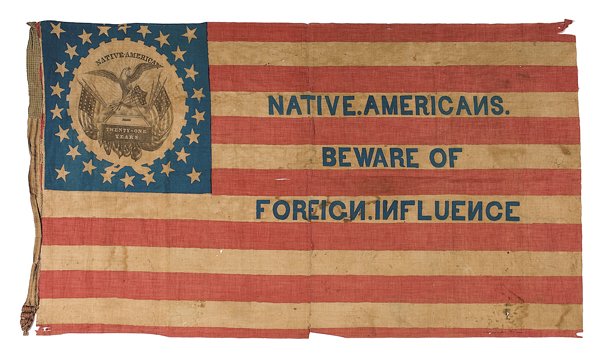Trump criticizes government, but he shot to the top of the GOP field by rallying voters against another enemy: immigrants from Mexico and low-wage workers in China, whom he blames for lost jobs and stagnant wages in America. He has proposed levying tariffs on imported goods, deporting millions of immigrants who entered America illegally and reducing the number of legal immigrants allowed in each year. [emphasis added]
[I read Shirer's Rise and Fall of the Third Reich recently. Pause here: Trump is not a neo-Nazi. He most closely resembles a neo-Know Nothing. Unpause. Over and over again Shirer expresses his incredulity at the facility with which the German people blamed the Allies for World War I, for the Treaty of Versailles, and the Jews for the economic disaster during the Weimar Republic. People need enemies and they're not going to find them looking in the mirror. No matter how bizarre, identifying an enemy by name, and it has to be a foreign group or a small native sub-group otherwise you get into the problem of the man-in-the-mirror, has political appeal. America has a paranoid streak in its soul going back to colonial days. "Taxation without representation" is NOT "tyranny," that is an absurd statement, the British were innocent of the extravagant claims of the American colonists, but by damn, that message, the message of the Declaration of Independence, had appeal, hooo-doggie.]
Critics, including many leading conservative economists in Washington, call Trump’s plans “nativist,” “protectionist” and incompatible with the party’s core pro-market beliefs. They also worry Trump’s ideas could spread to other GOP contenders.
[Just right, "nativist." Know Nothing: "The Native American Party, renamed in 1855 as American Party, and commonly named Know Nothing movement, was an American political party that operated on a national basis during the mid-1850s. It promised to purify American politics by limiting or ending the influence of Irish Catholics and other immigrants, thus reflecting nativism and anti-Catholic sentiment. It was empowered by popular fears that the country was being overwhelmed by German and Irish Catholic immigrants, whom they saw as hostile to republican values and controlled by the Pope in Rome. Mainly active from 1854 to 1856, it strove to curb immigration and naturalization, but met with little success."-Wikipedia]
“This is a very dangerous moment, I think, for the Republican Party,” said Stephen Moore, a conservative economist and co-founder of the Committee to Unleash Prosperity...“What Trump is saying about trade and immigration is a political and economic disaster. He’s almost now making it cool and acceptable to be nativist on immigration and protectionist on trade."
[It is a "dangerous moment," that is absolutely correct. Trump has been able to do a soul-meld with a segment of the American people, that is the key part of my argument. It is not just Trump, it was not just Hitler or even the Nazis, it was the German people, who gave Hitler and the Nazis overwhelming support, who made Nazi Germany, and it is a small but larger than expected group of the American people who are making Donald Trump "dangerous." The dangers are not of pogroms or concentration camps, for godssake. The danger is what these experts have said, an updated Know Nothing platform on immigation, and tariffs which would reinforce this defensive, fearful new American soul.]
praised his immigration focus. In a recent radio interview, Cruz said Trump was drawing attention to “the enormous downward pressure on wages and employment that unrestrained illegal immigration is providing.”
-Italicized from Washington Post.
...
Free-market economists have long argued that trade and immigration are critical to growing the U.S. economy. Top Republicans have frequently adopted those beliefs.
But a growing portion of the conservative base -- and, to a lesser extent, the country as a whole -- now blames American workers’ economic woes on competition from illegal immigrants and from low-skilled foreign factory workers abroad.
...
Some of Trump’s rivals, such as Gov. Scott Walker of Wisconsin and Sen. Ted Cruz of Texas, have praised his immigration focus. In a recent radio interview, Cruz said Trump was drawing attention to “the enormous downward pressure on wages and employment that unrestrained illegal immigration is providing.”
...
Moore notes that the last Republican president to erect large tariff barriers was Herbert Hoover, and that the results worsened the Great Depression. ["Hail Herbert Hoover!" That is absolutely correct, too, Smoot-Hawley.]
...
Asked about Trump, [Arthur Brooks, AEI.] said it was only natural that “early in the campaign, candidates are seeking to capture attention by channeling the worries of their most intense supporters.” [I do not think that what Trump is doing is natural, even for Republicans. Ronald Reagan did not point to the gathering gloom, he pointed to "morning in America."] But he predicted that voters would ultimately gravitate toward a more optimistic economic message. “Any candidate on either side who gets sucked into an arms race of competing pessimisms,” he said, “will be hurting themselves and their party.” [I think so, too, but I do not think that so so positively that I was tempted to write off Trump's candidacy early on, nor now. He has tapped into the worser angels of America's soul.]-Italicized from Washington Post.









